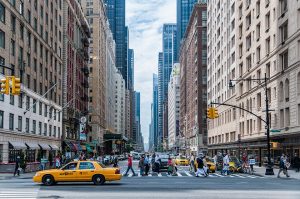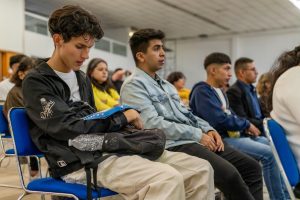Frequently Asked Questions at a U.S. Visa Interview

We always emphasize that you need to thoroughly prepare for your visa interview. If you have a complex case, not just a simple tourist visa but, for example, a student visa, it is recommended to undergo preparation with immigration specialists. In this article, we will review the common questions often asked at U.S. visa interviews and answers for commonly issued visas such as B-1, B-2, L-1, and M-1.
- Purpose of the Interview for Obtaining a Visa
The consul wants to understand who you are, your travel goals, and to assess your integrity. No country wants terrorists, illegal immigrants, or fraudsters who will arrive and start relying on government benefits.
!! The consul needs to be convinced that you have strong ties to your home country and that you are not intending to immigrate under the guise of a student or tourist visa.
The key at the interview is to be yourself, not lie, and answer questions clearly and calmly.
In this article, we will discuss the most common questions the consul may ask during your interview.
The questions may be asked either entirely or selectively. Depending on their mood, the consul might joke with you or, on the contrary, be less talkative.
Be prepared to answer the following questions.
- What is the purpose of your trip to the U.S.?
This is one of the most important questions. Your answer should be clear and concise.
You are traveling for tourism, education, or a business meeting. Your answer should align with the type of visa you are applying for. If the purpose is tourism, you might say that you want to see new places, gain new experiences, or visit the ocean. If it’s for educational purposes, your goal might be to gain new knowledge, get a promotion, expand your business, or acquire a new specialty. For a student visa, you might mention that you are planning to enter a university. And so on.
The visa officer wants to hear the honest truth about your future visit. A brief summary of the places you plan to visit would work best for a tourist visa, but also be ready to answer more detailed questions about the locations you wish to explore. If you are applying for a business visa, you must clearly explain the event or reason for your visit to the U.S.
Carefully prepare your story, your travel purpose, so that your answers inspire confidence and do not trigger a barrage of follow-up questions.
Think through every detail.
- Who is your sponsor, or where are your savings from?
Traveling to the U.S. is not cheap, and the consul is well aware of this, having a good understanding of average expenses for each region a visa applicant might want to visit. They may ask about your source of income. Can you support yourself after arriving?
Be ready to provide a bank statement, documents such as business or property sale receipts, proof of your position and employment.
You should know what expenses to expect and be able to demonstrate that in case of unforeseen costs, you will have enough money. The amount of money you have should approximately match the length of your stay in the U.S. For example, if you’re planning to visit New York, you will be asked about your flight, accommodation, meals, transportation around the city, sightseeing, and ideally, you should have some extra for “souvenirs.”
If you are traveling for one or two months, it’s advisable to have at least $3,000 per person for each month of stay on your card.
The larger the amount, the less concerned the consul will be about the financial aspect of your trip.
- Where exactly are you going?
This question carries a bit of a trick. The visa officer wants to hear not only where the applicant plans to go in the U.S. but also when they plan to leave. The best way to answer this is by clearly defining your trip and casually mentioning that you’ve already purchased a return ticket (toward the end of your response). If you’re traveling with someone, be sure to mention all family members if they aren’t currently in the interview.
If you’re a student, the consul might ask why you chose this specific educational institution and state.
Provide a clear and concise answer, such as “I like the climate” or “this institution has many positive reviews from experts.”
You’ve already done your research, dug into the internet, and you know everything about the school and the state you’re heading to.
- Why do you want to visit these specific cities? What will you do in each city?
This question is similar to the previous one, but not mutually exclusive. The officer may ask you to provide even more details and reasoning. Let’s say you’re going simply to see the U.S. and visit local restaurants. As a reason, you can say you want to try the dishes of a specific chef because you heard about their reputation from a particular show. But don’t make things up. If it’s true and you’re confident in your plans, answer boldly.
- What will you do in the U.S., and what is your plan?
This question is more common for tourist visas, but it can also be asked for business visas.
Outline your trip plan briefly to the consul. It should give the impression that you know what you’re doing. To answer this question, we recommend preparing a small road map of your trip with specific days for visiting various locations. If you can share some details about the places you’re going to visit, that would be even better. Remember, they may ask you more about these places, especially if the officer is familiar with them.
- Where do you plan to stay?
This question implies that you already have a reservation for a hotel, motel, or booking, and you should be ready to provide printed confirmation.
- What is your travel route? How will you be traveling within the U.S.?
The officer wants to hear about the types of transportation you’ll be using. If you’re renting a car, it’s a good idea to have a copy of your driver’s license. If you’re using other forms of transportation, just mention them.
- Do you have any relatives in America?
This question aims to determine whether you have strong family ties in the U.S.
Why is this important to the consul? People with strong family connections in America are statistically more likely to immigrate.
The consul wants to ensure that you don’t plan to stay in the U.S. permanently and that your stated goals—whether for a tourist or student visa—are genuine.
Be honest. If you have a sister in America, say so. Don’t lie, as consular officers can check your documents and family ties before the interview. Lying could result in a visa denial.
- Why haven’t you visited the U.S. before?
The consul may be curious about which countries you’ve already visited or ask why you’re specifically interested in America now. Why did you choose to go now?
Your answer should be part of your story and case. Prepare carefully.
Recommendation from the editors
There have been cases where visas were granted to people with a blank passport—those who had never traveled abroad. However, we recommend traveling to different countries before applying for a U.S. visa. It’s especially helpful if you’ve visited EU countries or the UK.
- Have you been to the U.S. before? What did you do? Which cities did you visit? Where did you stay?
This is straightforward—answer truthfully. The visa officer already knows about your previous trips and is checking your honesty.
- Which countries have you visited in the past few years? Where did you travel last?
If you have traveled, tell them where you went and what places or events you visited.
- Have you been denied a U.S. visa or a visa to any European country? Why were you denied?
Again, don’t hide anything. All U.S. denials, and likely those from Europe as well, are on their records. Any dishonesty will ruin your chances of getting a U.S. visa. Stick to the truth.
- Who do you usually travel with? Why are you not traveling together this time?
This is a trick question, especially for people over 25. The visa officer understands that by this age, people often have families, so they may phrase the question like this. If you are married but traveling alone, expect similar questions. For a tourist visa, you should prepare your story more carefully compared to a business visa.
- Do you speak English? What is your level?
This question may come up if your interview is conducted in Russian.
Most likely, your interview will be in English. We’ve noticed that embassies are gradually moving away from conducting interviews in the local language.
Prepare for the interview in English. This question may not even come up, as the consul will gauge your level during the conversation.
- Where do you work and what is your job? What are your responsibilities?
This question might be asked to verify your source of income or to confirm your ties to your home country.
To ensure your honesty and transparency, the consul might ask you to describe your responsibilities, inquire about when your workday starts, and even where you go for lunch.
Your profession may genuinely interest the consul, and they could dive deeper into this topic, asking, for example, whether you enjoy your job, what attracts you to your daily routine, and why you chose this profession.
- Do you have children or a family?
This question relates to your ties to your home country. If you’re traveling alone and leaving your family or children behind, there’s a higher chance you’ll return home.
They might ask you about your spouse or children, how old your children are, what they like to do, or where your spouse works.
Answer honestly and openly.
- What does your spouse do for a living? What is their job title and field of work?
If you mention that you have a spouse, the officer might follow up with this question. If you don’t know much, keep your answer brief and avoid making things up. If you don’t know because your spouse’s work is confidential, it’s best to say that their job involves a certain level of secrecy.
- Who are your main clients/partners/suppliers?
Such questions are typically asked if the applicant is a business owner, service provider, or manager.
- Which countries have you visited before?
This question has been partially covered in point 11.
They may ask you which countries you’ve visited, where you enjoyed the most, and which climate you prefer and why.
The consul may engage in casual conversation with you, or they might skip this question altogether.
- Do you have any hobbies?
The consul may ask about your hobbies during the interview to establish a closer connection with you and learn more about your personality.
Be honest, don’t claim to have interests you don’t actually pursue.
- What do you want to see in the USA? What do you know about the USA?
The consul might engage you in a conversation about your dreams of visiting the USA.
They may ask, for example, what you’ve always dreamed of seeing or what interesting things you know about the USA or American culture.
These are the main questions you might be asked.
Not all of them directly relate to obtaining a U.S. visa—many are about your personal life.
Additionally, we’ve gathered some more questions that have been asked during interviews:
- How are you feeling today?
If the consul is in a good mood and notices that you’re too tense or nervous, they might ask about your mood or what you had for breakfast to distract you and help you relax.
Although some people might find these questions confusing and become even more nervous, it’s better to smile and answer honestly.
- Are you nervous? Why?
If it’s clear that you’re very anxious, the consul may ask why you feel this way.
Why are you so worried about not getting the visa? What impact will this decision have on your life?
We recommend preparing well for the interview so that you don’t come across as unsure or insecure.
The consul should see a confident person in front of them, someone who doesn’t act as though everything is at stake or that their life depends on whether they get the U.S. visa or not.
- What are your dreams?
This question might also come up to help the consul understand more about you and how your trip to the USA could help you achieve your goals.
Don’t say that your lifelong dream is just to visit the USA, see the ocean, Disneyland, etc. This could lead to unnecessary questions.
Your main goal at the interview is to obtain the visa.
Your task: be prepared for the questions, appear confident, and have all the necessary documents ready if requested.
We hope this guide helps you get your U.S. visa approval! Good luck!
Table of Contents


